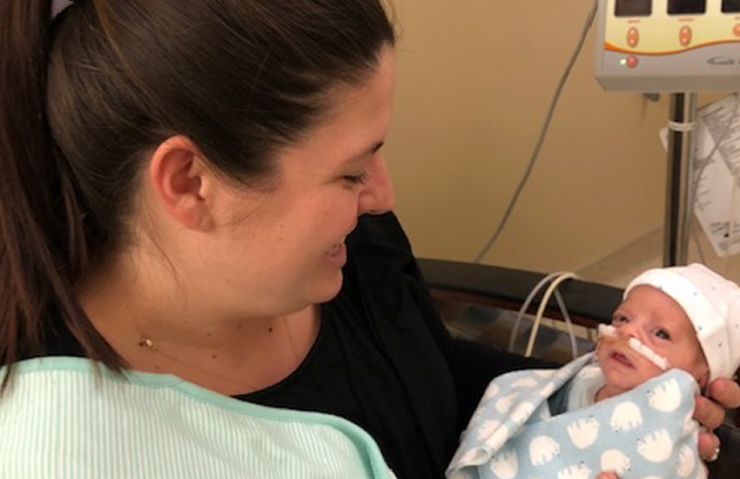When a baby is born prematurely, their ability to feed, to ward off infection, and to grow strong and functional vital organs are all compromised. During this vulnerable time, premature infants may require months of round-the-clock care in a highly regulated NICU with specially trained staff.
For the new mom of a premature infant, the experience can be traumatic and have a profound effect on her mental well-being.
Michael Arrives Months Early
Michelle Presta’s first baby, Michael, was born at 27 weeks, weighing just 2 pounds and requiring a long NICU stay. During pregnancy, Michelle suffered from preeclampsia, a hypertension (high blood pressure) disorder, impacting 5-8% of all births in the United States.
During her early pregnancy, Michelle had multiple symptoms. Her feet and eyelids swelled, she experienced headaches, and spent weeks working with doctors to lower her blood pressure—including a week of inpatient care at Stony Brook University Hospital. Michelle spent the 2018 holidays at home monitoring her blood pressure, but by the end of the year she was diagnosed with preeclampsia and was readmitted to the hospital.
Although Michelle and her medical team were hoping that she could wait out her 34 weeks gestation in the hospital, Michelle stopped responding to medication. Michael was delivered by C-section in early January. His due date was April 12 and he spent 119 days in NICU.
Michelle visited the hospital every day of Michael’s stay and during that time, she says that she slipped into survival mode. Although Michael’s medical interventions were managed by the care team, she felt that her only job was to stay at her baby’s side.
Michelle’s husband, a paramedic, was able to be more logical about the process and listen to the facts as they stood that day. Michelle would instead worry about the future and slide into panic, she said.
A Tsunami of Emotions
Michelle suffered from overwhelming feelings of anxiety and survivors’ guilt, and was diagnosed with PTSD.
During Michael’s time in NICU, Michelle talked with other NICU moms and joined a peer support group so she could talk with other women who fully understood her experience. She connected with Danielle Donohue, our March of Dimes NICU Family Support Program Coordinator, who had a premature baby herself and is intimately aware of the toll this experience can have on a mother. According to Michelle, “All these feelings of guilt were overwhelming; it wasn’t supposed to be that way. Danielle had been through it. She understood the feelings you went through.”
Michelle eventually worked with a mental health professional and an EMDR therapist. She says she will always remember the words of her therapist: “Think of a messy closet stuffed so full that you can never shut the door. A closet which will burst wide open with a bump. With therapy you get the tools to slowly empty out and tidy your closet, so you don’t trigger an explosion every time the door gets tapped.”
After her own difficult experience, Michelle is now an advocate for peer support programs and professional intervention for those who need it.
How is Michael?
“Michael is a rockstar and our very own superhero,” Michelle said. He still receives physical and occupational therapy, but is a typical 3.5 year old boy who loves super heroes and dressing up as Ironman (among many others). He is a perceptive and empathetic little boy with lots of energy.
Despite her experience, Michelle realized that she would love an addition to her family. She worked with the Stony Brook high-risk obstetrics team to minimize her risks during pregnancy and gave birth to Miles at 36 weeks and 2 days. He weighed in at 5lb 2oz and required no NICU stay. As Michelle says, “It was a totally different experience.”
Michael loves being a big brother to Miles, who will be 1 in December.

Michelle’s Advice to Moms with Premature Babies
Share Experiences
Michelle says that it is essential to reach out to someone with similar experiences who can understand your feelings without judgement.
Women with a similar experience have an understanding and empathy that others just can’t share – even close friends and family can’t always find the right words to support you, and you don’t always want them to have to support you when they too are struggling.
Stony Brook is one of the few hospitals in the U.S. with a NICU Family Support Program that connects premature baby moms with a support network.
Michelle is now a member of the March of Dimes Family Staff Advisory Council, which brings families and staff together to influence NICU care.
Finds Ways to Be Useful
Moms of premature babies must rely on a team of strangers, however loving, to keep their baby alive. For Michelle, this caused feelings of sadness and guilt because she could not do more for her own child.
Michelle was able to produce breast milk and says that she “pumped like a maniac” because it was the one valuable thing she could contribute. When Michael was physically able, Michelle provided skin-to-skin time, which was satisfying and useful.
Skin-to-skin care may help premature babies to:
· Regulate heart rate and breathing
· Gain weight
· Increase periods of deep sleep
· Improve ability to breastfeed
Supporting and sharing with fellow NICU moms and their support group was another way Michelle was helpful in her new community.
Ask For Help
Michelle says never be too proud or too “mom-busy” to seek professional help. Weeks and months watching a tiny baby struggling can be traumatizing – especially when you are left in the role of spectator.
Don’t underestimate the toll this can have on your mental health and seek professional support when you need it.
Don’t Forget
Your baby is not going to remember any of what they went through in NICU, even though we will never forget it.











